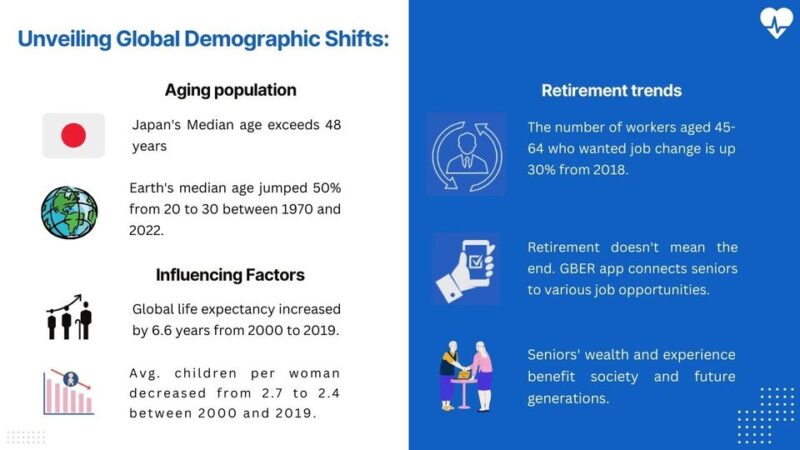The Underleveraged Knowhow of Older Workers

Whichever way you stack the numbers, the human race is getting older. The median age of the Earth’s population was 20 years old in 1970. By 2022 that had jumped by 50% to 30. Dealing with this ongoing seismic shift is unavoidable, and though all is not rosy, there will be silver linings to this demographic greying.
One potential upside is that seniors have on average accumulated more wealth than their younger counterparts, funds that can be invested or spent given the right circumstances. And it is not only material wealth that people accumulate over the years, but also a richness of knowledge and experience that similarly can be put to use in the right environment.
In November last year the eighth billion person on the planet was born. Despite the seemingly inexorable growth in population, some recent studies suggest the number of humans may peak at approximately 9 billion around 2050, smaller and sooner than previously predicted. Whatever the final figures turn out to be, we are ageing as species. Global life expectancy grew by 6.6 years between 2000 and 2019 alone, while the average number of children born per woman dropped from 2.7 to 2.4 over the period.
Peaks and troughs
There are inevitable concerns about the impact of this on economies around the world, which have relied significantly on expanding populations and workforces to drive growth. Japan, the poster child for problematic demographics with a median age of over 48 years, saw its workforce peak in 1995. Though overall growth has been anaemic since then, its economy has nevertheless remained relatively strong despite its working age population continually shrinking for more than quarter of a century.
Many of the lessons learned and solutions implemented in Japan will be applicable elsewhere as other countries tread the same path. Facilitating more participation by seniors in the workforce through flexible working practices and initiatives such as job sharing and consulting roles can alleviate labour shortages, reduce public spending and leverage the knowhow of veteran workers.
Japan has steadily raised the retirement age since it was lifted from 55 to 60 in 1998. In 2021, a government directive was introduced urging firms to allow employees to work on until 70 if they desire. The official retirement age for local and national government workers was lifted by a year to 61 in April and will be raised by one year every two years until it reaches 65 in 2031.
Digital grey
Even official retirement doesn’t have to mean a complete end to working lives. An app known as GBER — standing for Gathering Brisk Elderly in the Region and riffing on colloquial Japanese terms for ‘grandma’ and ‘grandad’ — has been piloted in Chiba, Kumamoto and more recently parts of Tokyo. The app has matched thousands of retired seniors with opportunities in fields ranging from nursing and childcare to construction. The majority of the jobs so far have been short-term or temporary, but the potential for expansion is clear.
Such apps can be viewed as a digital upgrade of the Silver Human Resources Centers which have been finding mostly light, unskilled work opportunities for retirees around Japan since the mid-1970s. They offer a wide range of work that allows people to put their expertise to use, as well as simpler tasks such as gardening.
Though many seniors have considerable knowledge and experience, upskilling and training to get them up to speed on new technology and working practices will often be necessary. It is not only seniors who require learning new ways, some younger personnel need to shake off ageist attitudes for older workers to be able to fully thrive.
Win-wins
Healthcare is a sector that will both continue to expand as society greys and that is in a position to better utilise the burgeoning ranks of active and capable seniors. Many retirees are already engaged in providing almost full-time care for their own elderly parents on a private basis. Caring for the aged who are not relatives on a part-time basis and being remunerated may for many be a lower-stress win-win.
It is not just among those who have reached the traditional retirement age that shifts are occurring. In the first three months of this year, an average of 3.8 million workers in Japan aged between 45 and 64 said they wanted to change jobs, according to a monthly survey by the Ministry of Internal Affairs and Communications. That was up by 30% over the same period in 2018, as compared to a 16% rise among employees of all ages. While this reflects a general trend of more mid-career hiring in Japan, with companies extending or abolishing mandatory retirement ages, a growing cohort of older workers are looking to broaden their horizons.
Between workforces shrinking and AI bringing disruption to the job market, the employment landscape is facing an era of change ahead. Older workers are on course to play a more important part than ever and bring their knowhow and experience to bear in these new times.
By Gavin Blair
We are currently looking for these roles: (No Age Limit)
-AWS Solution Architect
-Engagement Manager for Telecom Domain
-Senior Program Manager / Delivery Partner
-Account Delivery Head
-Project Manager - Cloud
-Automotive /Manufacturing Sales Manager
-Global Account Director – IT
-Project Manager - Life Insurance
-HRBP
To find out more about hot roles in healthcare and elsewhere please contact us at +81-3-5962-5888 or email us at info@slate.co.jp
